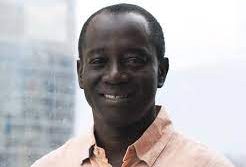By Sam Kargbo
In a nation where silence has become survival, and the price of truth is often exile—of spirit, if not of self—Oumar Farouk Sesay remains a defiant beacon of intellect, courage, and poetic fire. When others have whispered or turned their backs to the rising dusk of repression, he has spoken. When the music of sycophancy filled the halls of power, he turned away from the chorus and chose the quiet dignity of truth-telling. Not because it is safe. Not because it is popular. But because someone has to. Because someone must.
Oumar Farouk Sesay is not just a poet or playwright; he is a sentinel of conscience in Sierra Leone’s weary democracy. A laureate of resistance, whose verses walk the fine edge between fire and forgiveness, critique and care. His writing is not merely beautiful—it is necessary. His words, as in his caution to President Bio—“When the music of sycophancy stops—and it always does—you will be left alone on the dance floor”—echo the prophetic tradition of poets who do not merely entertain, but unsettle.
He does not write from safety; he writes from the front lines of memory, of justice, of forgotten dreams. He risks everything so that the people of Sierra Leone might remember how to dream again.
In an era where power seeks only applause, Sesay offers uncomfortable mirrors. In a climate where many intellectuals have been cowed into silence, he reminds us that the pen, wielded without fear, is still mightier than the iron grip of censorship. His bravery is not loud but deliberate. It’s not theatrical but enduring.
Oumar Farouk Sesay teaches us what it means to be a patriot—not a blind devotee of state, but a relentless lover of people, of principle, of potential.
His verse is a quiet rebellion, a drumbeat for the conscience of the nation, urging those in power to remember that legitimacy does not come from fear but from service. That leadership is not preserved in sycophantic songs but in the hard, humble labour of healing and rebuilding. To stand firm as the lights dim around you takes the kind of courage we rarely see in public life anymore. Oumar Farouk Sesay stands—not for power, but for posterity. Not for popularity, but for possibility.
And so, let this be known: when the histories of Sierra Leone are written—not by propagandists but by those who love truth—Oumar Farouk Sesay will not be remembered as a man who kept quiet in dark times. He will be remembered as the poet who lit a lamp when all others dimmed theirs.
He speaks still. And because of that, so may we.
With love ,
From
Abuja
04/07/2025










